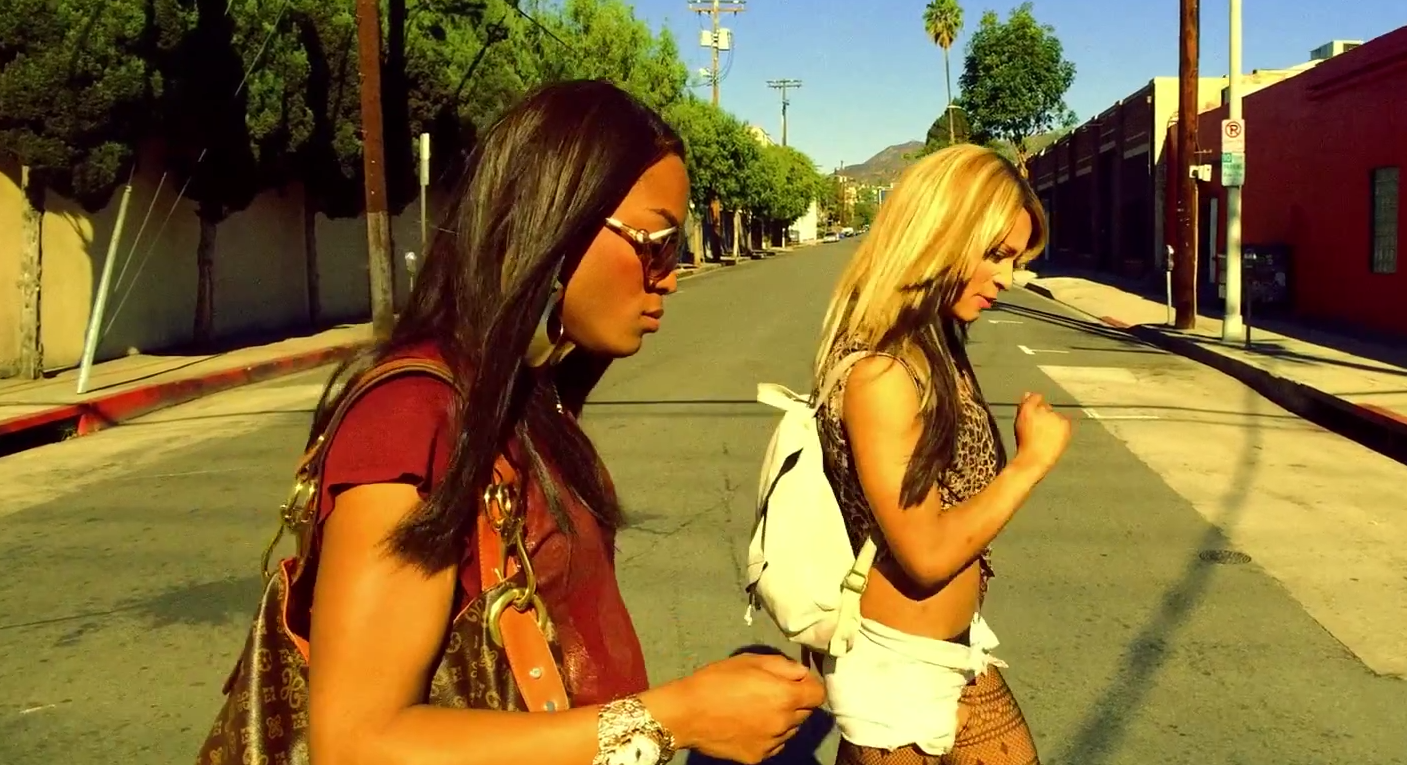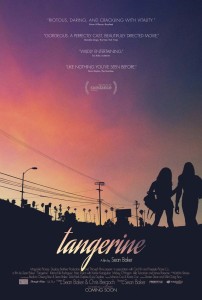Director: Sean Baker
Genre: Comedy, Drama
Release: 2015
TANGERINE opens with simple credits in an elegant font displayed against a heavily graffitied surface. The messy randomness of the scratches makes it clear that this was a discovered surface, yet a gap in the direct center allows the neat credits to be nicely framed by the chaotic markings. It’s a fantastic way to understand what TANGERINE is all about, finding genuine detritus and decay and using it to tell a beautiful story. Make no mistake, TANGERINE is a messy film, but its a film which celebrates its flaws in an unabashed burst of provocative images. TANGERINE is the story of a transgendered sex worker, Cassandra, living in Hollywood who has recently been released from prison, only to find that her pimp/boyfriend has been cheating on her with a cisgendered woman. The trail of chaos Cassandra leaves behind her as she searches for her boyfriend and his mistress is equal parts astounding and hilarious, heightened by the fact that this is all happening on Christmas Eve.
In the opening moments of the film, viewers who are used to high production values may find themselves wanting to sneer at the “flaws” of the scenes captured in such low-quality. In fact, for the first 20 to 30 minutes, it can almost feel like co-writer/director Sean Baker is intentionally forcing the viewer to decide if they can continue to watch something that on the surface is Vine-level cheap and trashy. But as the film continues and the narrative spirals into ever-more enrapturing drama, Baker rewards the viewer with more and more provocative and exciting images. TANGERINE is a movie about people who are seen as poor and trashy, and who live in poor and trashy circumstances; to tell their story in any other form apart from iPhone footage would not accurately convey their world. That’s not meant to be an insult to the characters of this film; stick with the film’s unusual style and unusual protagonists, they become so much more than the sideshow freaks the outside world tries to think of them as. The stars, Kitana Kiki Rodriguez and Mya Taylor, are transgendered individuals who have actually been sex workers at varying points in their lives, and the painfully funny honesty with which they play their characters is nothing short of amazing.

Mya Taylor (left) portrays Alexandra, while Kitana “Kiki” Rodriguez portrays Sin-Dee Rella
This is a rare film which can be enjoyed on multiple levels and hold unique value in all of them. The script can seem clunky and exposition heavy in the beginning, but it builds to such a frantic climax and powerful conclusion that it has to be respected. The script also refuses to tie up loose ends. There is no resolution to these characters’ problems and this is the entire point; their marginal lives will remain on the margins. The cinematography can seem shoddy at times, but at other times the unconventional framing and the freedom of movement the iPhones provide allow for truly original images. The editing has the frenetic pace of Vine videos; Sean Baker said in an interview on Fresh Air that he drew a lot of inspiration for the film from Vines during the editing process. While this could be headache-inducing in less adept hands, Baker manages to instead create a new and enrapturing visual shorthand, cutting at lightening speed while still keeping the viewer grounded in the immediate events. Overall, there is a lucidity to TANGERINE that few films ever achieve; it pulls you so deeply into a world normally just out of sight that you forget you are watching a film entirely as you get lost in the narrative. It’s exciting cinema because it’s new cinema; while there are any number of films which could be cited as influences, it’s best just to appreciate TANGERINE as its own unique work because there truly are no predecessors to it.
The thing TANGERINE will be remembered for is that it was shot entirely on iPhones for $100,000, but it offers so much more than an indie gimmick with new technology. With a narrative that starts out painfully simple, TANGERINE manages to take you down the intricate rabbit hole of poverty and abuse which leaves trans people at such high risk of being forced into sex work. At the same time, however, TANGERINE refuses to make its characters tragic victims, instead portraying them as funny, exuberant, and strong people attempting to live their lives by the marginal means provided to them. As grimy and dark as the world of TANGERINE can seem at times, the film consistently evens out with humor and hope. If there is a direct moral to TANGERINE, its buried deep in a narrative that is more focused on shining a light on a place that the viewer probably wouldn’t go on their own. Instead, it invites the audience to try to make sense of the world the characters inhabit and draw their own moral conclusions from there. TANGERINE ends in a laundromat, another clearly found location, and while Rodriguez and Taylor’s characters may not be any better off than they were to begin with, there’s an obvious sense that they are lucky to have found each other, especially on Christmas Eve.
Verdict: Recommend

